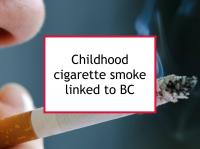Cigarette smoking has been reported to be linked to heightened breast cancer risk and reduced survival. The added risk appears to be greatest for women who start smoking at a young age. For example, one study reported that those who began smoking before age 17 had a 24% higher risk than never smokers.
There are times of potential vulnerability during which the harmful effects of cigarette smoke exposure are heightened, including the prenatal period, childhood, and prior to first pregnancy. Both active and passive smoking during these windows of susceptibility are associated with higher risks of breast cancer. Now a major new Scandinavian study has reported that women who never smoked, but were exposed to second-hand smoke from parents during childhood, had an 11% higher risk of breast cancer compared to those not so exposed.
Second-hand smoke and breast cancer risk
Exposure to second-hand smoke in adulthood generally has not been found to be linked to significantly increased breast cancer risk. However, prenatal and childhood second-hand smoke exposure has been associated with heightened risk in adulthood. Prenatal exposure to maternal smoking has been found to be associated with early first period, which in turn is linked to increased risk of breast cancer. Prenatal exposure to second-hand smoke was reported to be associated with a 16% increase in breast cancer risk among nonsmokers, as was paternal smoking before the mother's pregnancy (12% increase), in one study.
Latest research finds childhood smoke increases risk
The study referenced above was designed to investigate the association between exposure to second-hand smoke from parents during childhood and overall breast cancer risk, as well as risk by estrogen (ER) and progesterone receptor (PR) status.
To conduct the study, the authors retrieved data concerning 45,923 never-smoking women, aged 34 to 70, in the Norwegian Women and Cancer Study. Study participants completed a baseline questionnaire between 1991 and 2007. The authors also obtained data concerning these women through December 2018 using linkages to national registries . The women were followed for an average of 19.8 years.
A total of 2,185 study participants were diagnosed with invasive breast cancer during follow up. Women who had been exposed to second-hand smoke as a result of parental smoking during childhood were found to have an 11% higher risk of breast cancer in adulthood compared with those who were not so exposed. The results held regardless of ER or PR status.
The authors conclude that 1 in 14 breast-cancer cases in non-smokers could have been avoided had their parents not exposed them to second-hand smoke during childhood. Cancer attributable to second-hand smoke may be underestimated, according to the authors.
Please see our smoking tag and articles on protecting our daughters from breast cancer during the prenatal period and infancy and childhood and puberty for more information.
